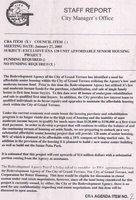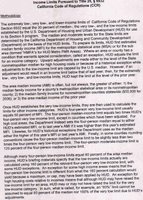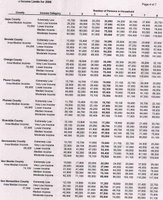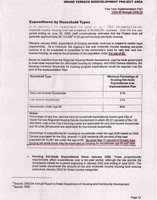Attorney impacts several cities
Files lawsuits on environmental grounds
Stephen Wall, Staff Writer
Article Launched:10/22/2006 12:00:00 AM PDT
* Environmental lawyer Raymond Johnson is a thorn in the side of city officials throughout the region.
* In the nine years he's been an attorney, the Temecula-based Johnson said he has filed about 200 lawsuits, nearly all of them related to potential violations of state environmental laws.
* Of the four largest projects under consideration in Grand Terrace, he has sued on three of them.
*He also is challenging Loma Linda's recently approved General Plan as well as Fontana's approval of a new Home Depot.
* Other municipalities he has sued include Apple Valley, Victorville, Beaumont, Hemet, Palm Springs, Temecula, Murrieta and Riverside.
*Wal-Mart is a favorite target, along with housing developments, retail projects and even a senior center.
*Critics say Johnson uses technicalities and loopholes in the California Environmental Quality Act, or CEQA, to prevail in court.
*"Everybody needs to make a living," said Loma Linda Mayor Robert Christman. "But they're making it at the expense of the taxpayers on frivolous lawsuits. When you bring CEQA into the picture, if you cut one blade of grass, somebody can allege you harmed the environment and can file a lawsuit that can cost hundreds of thousands of dollars."
*Johnson, 59, scoffs at the notion that the lawsuits are without merit.
*"They always call it a frivolous lawsuit right before they lose it, which is an indication that it was not a frivolous lawsuit," Johnson said. "I win the overwhelming majority."
*Johnson estimates that he takes home about $100,000 a year after expenses. His three-attorney firm, Johnson and Sedlack, costs about $25,000 a month to run, Johnson said.
*He said his fee to take a case ranges from $500 to $70,000, with most cases costing between $5,000 and $10,000.
*"If we win, we're able to collect our attorneys' fees from the other side," Johnson said. "Typically, what our client paid will be refunded to them. If we lose, their only cost is whatever the agreement provides."
*Some city officials say Johnson prefers to settle cases before trial and that he rarely succeeds in stopping projects from being built.
*"The cost of settling is clearly cheaper than running it through the legal process," said Grand Terrace City Manager Tom Schwab. "If you're a developer, you factor it into the cost of doing business."
*Johnson said about one-third of his suits are settled out of court.
*"When you're talking a settlement on a CEQA suit, you're not talking about clients getting money," Johnson said. "They're getting modifications to the project to make the project a better project."
*Johnson acknowledges that most projects he opposes in court still get built.
*"A lot of times, it's not about stopping a project, but about getting traffic, noise or health problems fixed," Johnson said. "That's the bottom line. It's trying to avoid the environmental problems that the project creates."
*Johnson sued Grand Terrace over plans for a 120-unit senior apartment complex, an outdoor-themed retail center and construction of an electrical-wholesale business.
*Johnson prevailed in the first two cases, while the third case is in the process of being settled.
*"Grand Terrace is an easy target," Johnson said. "They need to actually try to comply with the law instead of trying to figure out how they're going to avoid it."
*Schwab said the city makes every effort to obey the law, but it's nearly impossible to get any project approved without some kind of environmental objection being raised.
*"The burden of proof falls very much on the public agency or the developer," Schwab said. "It's pretty easy to get a judge to say that there could be a need for additional environmental review."
*San Bernardino Superior Court Judge John P. Wade earlier this year ruled that Grand Terrace must perform a detailed environmental study before moving forward with the senior project. The study will cost $42,000 and delay the project about eight months, Schwab said.
*Wade earlier this year also invalidated the environmental report for the outdoor center plan because he said it didn't properly address all potential impacts.
*Johnson offered to settle that lawsuit for $30,000, but the City Council decided to fight the case on principle, Schwab said.
*"The council felt it wasn't right to settle when there really weren't any valid issues in our opinion," Schwab said.
*City officials said the lawsuit dealt with a project that has changed significantly since the original outdoor adventure center plan was developed more than two years ago.
*The previous concept that called for an 8-acre lake with boat dealers was scaled down to a traditional freeway-oriented retail center with a 1.5-acre lake.
*The city is moving ahead with the outdoor retail project without changing the zoning for the area. Officials said they need to obtain additional funding to improve traffic circulation before building the project.
*In Fontana, Johnson filed a lawsuit in late September against a proposed Home Depot south of Interstate 10.
*Mayor Mark Nuaimi calls the suit a delaying tactic.
*"I often believe that the environmental lawsuits that are brought forward are meritless," Nuaimi said. "I trust our process was done correctly. Unfortunately, we will have to expend resources to prove that."
*In Loma Linda, the slow-growth group Save Loma Linda hired Johnson to challenge the City Council's approval in July of its new General Plan, claiming the document didn't address traffic, air quality and other potential environmental problems.
*"We hired an expert to ensure that the citizens of Loma Linda are well-represented," said Ovidiu Popescu, a member of the group. "CEQA regulations are vital for the welfare of the citizens, and we feel they must be followed."
*Johnson said he is concerned about environmental protection and economic justice.
*"When a Wal-Mart goes in and cons a city into not doing traffic mitigation, that means the rest of the citizens have to pony up and pay the cost of the improvements that Wal-Mart didn't pay for," Johnson said. "That means the average Joe working two jobs ends up subsidizing Wal-Mart or subsidizing the developers."
*Schwab agrees that environmental laws have a purpose.
*"But they certainly can be misused," Schwab said. "There are areas of environmental law that are not crystal clear. But I don't think any of these people are destroying wetlands or harming endangered animals to build a Home Depot."
NOTE TO READERS: Tom Schwab : Earns $150,000.00 and takes his pay home to a House the City Provided him in a Vehicle Paid for with Redevelopment Agency Funds. HE advised approval of all the plans brought to court in spite of Citizens raising concerns in the Planning Hearings and at City Council Meetings they were approved and were not held up under the challenge of trial. So who is responsible for wasting the Citizens Money, and Developer’s Time? Let us look has the origin of the problem not the mid way point. Tom Schwab as City Manager is under the Direct Oversight of the City Council Members. This demonstrates one of the reason there is a need for a Change on the City Council in Grand Terrace. Failure to stay out of the Courts is a costly failure, and expresses an anti citizen attitude to the public concerns as they are brought forward.Putting blame on Johnson, or the Citizens he represents is like being a smoker and being mad at the doctor who finds a cancer, after a spouse nagged you to go to the Doctor. Question is when the Sun writes with this slant who are they trying to support? The Developers, and Real Estate Dealers who are being forced to comply with the law, like Citizen John Doe would be required to? Interesting Public Trust the Sun has shown.
















